Four Corners: Winners and losers of 2017 NBA free agency
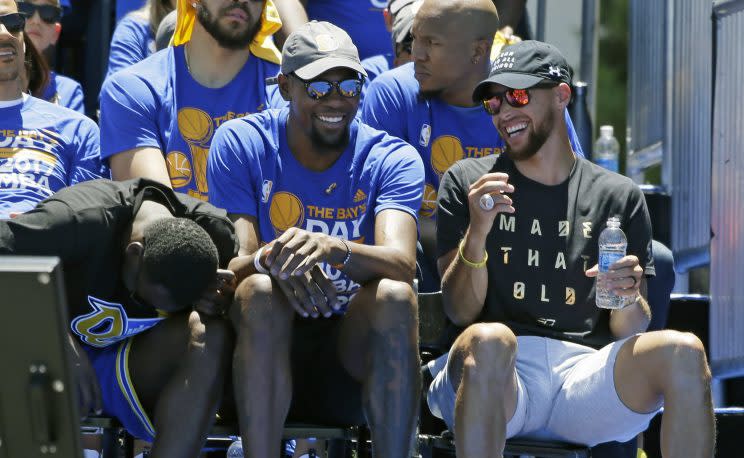
Now that we’re past Independence Day and most of the top-tier free agents have agreed to terms to either head for greener pastures or stay put, we thought it was time to convene for a new Four Corners roundtable discussion. This week’s topic: Which teams look like the winners and losers of the 2017 NBA free agent period?
Here are our picks. Let’s hear yours in the comments.
***
WINNERS
Golden State Warriors
The Warriors are not especially different from what they were when they dominated the 2017 NBA playoffs, and that itself makes them one of the biggest winners of free agency. The Warriors hit July 1 with the possibility of losing Hamptons Five glue guy Andre Iguodala, key reserve Shaun Livingston, starting center Zaza Pachulia, and every other bench player who saw significant time in the postseason. Less than a week into free agency, they’ve retained everyone of massive importance, added a few new players who could prove useful, and convinced one of the best players in the sport to return at a significant pay cut that will save the owners a fair amount of money in luxury tax. Golden State still needs to find some big men, but they’re officially set to enter 2017-18 as overwhelming favorites to repeat as champions.
In truth, only Iguodala seemed like a true threat to leave out of their core four free agents. Stephen Curry was always going to sign his record-setting contract, Kevin Durant only had doubts about how much he’d give up for the good of signing other players, and Livingston agreed to his deal within a few hours of the start of free agency. Iguodala took meetings with other teams, but his eventual three-year, $48-million contract signaled that the front office was never really ready to let him go. The Warriors were not going to give up the opportunity in front of them. You don’t sacrifice a burgeoning dynasty to save what’s ultimately comparable to an accounting error.
The only question now is exactly how impossible the task of beating the 2017-18 Warriors will seem. With David West back, Omri Casspi and Nick Young in town to shoot threes, and at least one center on the way soon, Golden State should have the depth to match this season’s achievements. Short of a major injury, it’s hard to imagine them being worse. — Eric Freeman
[Fantasy Football is open! Sign up now]
Oklahoma City Thunder
Heading into the summer, the Thunder seemed to be stuck in a holding pattern, under some hefty contracts and light years behind the West’s top tier. Then they won the first weekend of free agency before it even began by turning Victor Oladipo, his $84 million contract, and Domantas Sabonis into Paul George. At worst, the trade is an Oladipo salary dump, with the rights to 2016 lottery pick Sabonis the cost of doing business. At best, it’s a deal that could return the Thunder to the ranks of Western Conference contenders for years to come.
The demise of the 2016-17 Thunder was crammed into 46 revealing playoff minutes. Over five games against the third-seeded Houston Rockets, OKC outscored Houston by 4.9 points per 100 possessions with Westbrook on the court, according to NBA.com’s lineup data. But in those 46 minutes with Westbrook sitting, the Thunder were outscored by 61 points (-51.3 per 100 possessions). Oklahoma City lost the series in those 46 minutes. That’s why the George move is so critical.
OKC’s sans-Westbrook units had struggled all year, scoring 97.4 points per 100 possessions versus 107.9-per-100 when the league’s MVP was on the court. That’s the difference between the 11th-best offense in the NBA and its absolute worst. Incidentally, George was in a similar spot in Indiana. The Pacers scored 108.9 points per 100 possessions with him in the floor, but just 100.5 when he sat — the difference between the seventh-best offense in the league and last place.
Assuming head coach Billy Donovan staggers Westbrook’s and George’s minutes — something he didn’t always do with Westbrook and Kevin Durant — OKC should be much better on offense in 2017-18. And when the two stars play together, which will still be often, George will slide off the ball and become one of the most dangerous second options in the league. The two will also have more shooting around them with Patrick Patterson joining the fold on a three-year, $16.4 million deal, and the Thunder’s starting lineup figures to once again be excellent defensively after bringing back perimeter stopper Andre Roberson with a three-year, $30 million contract.
The Thunder have had an outstanding seven days, and look like a surefire top-four team in the West. If they can add a little bench help with some savvy minimum-salary pickups, they could push for a top-two seed. — Henry Bushnell
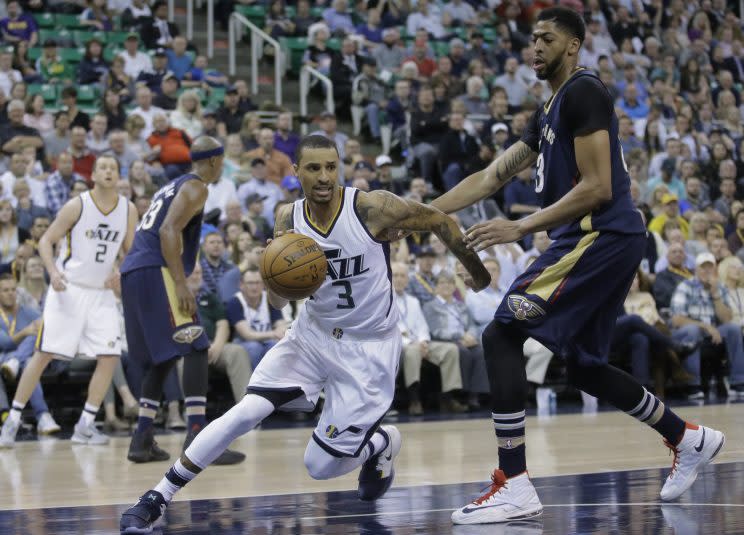
Sacramento Kings
Sacramento’s biggest free-agent signings of the past five years, in chronological order, were Aaron Brooks, Carl Landry, Darren Collison, Rajon Rondo and Arron Afflalo. Only Rondo came with noteworthy credentials, and he was operating on a one-year deal to prove his value again after a disastrous tenure with the Dallas Mavericks. And only Rondo left with much cred, either, having led the league in assists per game in his one season on the team.
All of those players are gone now, and the Kings have nothing to show for them. Less than nothing, actually, since they swapped first-round picks with Philadelphia last month and still owe the 76ers another pick as a result of dumping Landry’s salary in the disastrous 2015 Nik Stauskas deal, which was made to free cap space for Rondo and other free agents who never came. (To be fair, center Kosta Koufos, one of the players signed with that cap space, is still around. And Sacramento does have second-year guard Malachi Richardson, whose draft rights the Kings acquired from the Charlotte Hornets in exchange for Marco Belinelli, another player signed with the Sauce Castillo-created cap space. In general, though, the point stands.)
That’s how bad the first few weeks of July have traditionally been for Sacramento. So landing George Hill, the best free-agent point guard to change teams in July, and Zach Randolph, still among the handful of best power forwards on the market at age 36, is remarkable, really.
Not only that, but Kings general manager Vlade Divac landed both on relatively affordable and short-term deals. A steady two-way point guard whose teams have missed the playoffs only once in his nine NBA seasons, Hill will make $57 million over the next three years, or $6 million less annually than Jrue Holiday will earn from the New Orleans Pelicans for the next five years.
[Follow Ball Don’t Lie on social media: Twitter | Instagram | Facebook | Tumblr]
Memphis legend Randolph will get $24 million over the next two years, or $4 million less than Taj Gibson just got from the Minnesota Timberwolves. The Kings also added sweet-shooting 24-year-old EuroLeague phenom Bogdan Bogdanovic for the mid-level exception — not to be confused with ex-Nets and Wizards shooter Bojan Bogdanovic, to whom he is not related (and who’s actually from Croatia, while Bogdan hails from Serbia) and who stands to make more money in free agency.
In the process, Sacramento built depth at three positions and surrounded a young core of recent lottery picks, led by De’Aaron Fox and Buddy Hield in the backcourt of the future, with a pair of veterans respected for their workmanlike approach to the game. It’s almost as if Divac figured out this GM thing. Either that, or new executive vice president Scott Perry straightened him out. — Ben Rohrbach
Denver Nuggets
The Nuggets were one of the best stories in the NBA over the final four months of last season. Led by the efficient scoring and breathtaking playmaking of Serbian center Nikola Jokic, Denver developed into a surprisingly fun-to-watch offensive juggernaut after a slow start, posting the West’s seventh-best record after Jokic’s re-entry to the starting lineup in mid-December before finishing one win out of the conference’s final playoff spot at 40-42.
For a squad featuring a legitimate game-changer at the five and multiple promising young pieces on the wing and in the backcourt, the Nuggets’ best-case scenario in free agency was coming away with a defensively versatile veteran power forward who can fit into a flowing read-and-react offense and has experience playing on winners. Landing Paul Millsap, then, on a three-year, $90 million deal constitutes a big ol’ win for a Denver team that needed a jolt to take the next step along the road to contention.
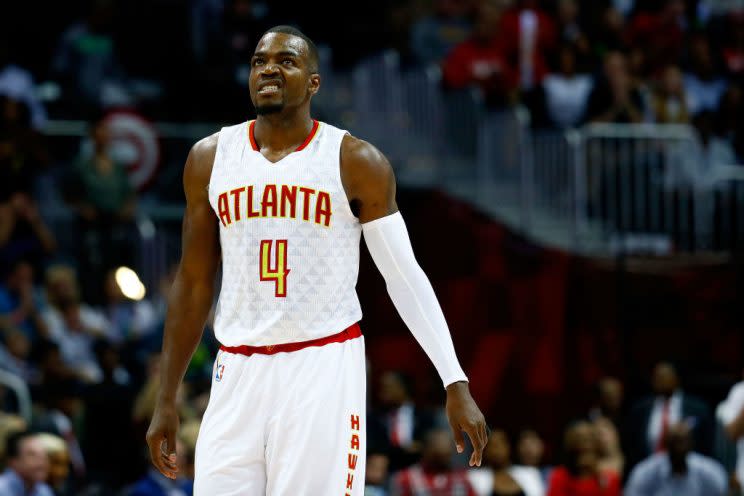
As I wrote when the deal went down, the 6-foot-8, 245-pound Millsap is an incredibly smart, active defender whose talent for contesting shots, snagging steals and moving in space should immediately help shore up a defense that ranked second-worst in the league last season. He’s also an effective offensive player who can pick-and-pop, space the floor, bang in the post and make plays for others without needing to soak up a No. 1 option’s share of touches. And with the Nuggets holding a team option on the final year of the deal, Denver retains the option to walk away in two years if things go south while maintaining the financial flexibility they’ll need to extend the contracts of Jokic and shooting guard Gary Harris when their rookie deals are up.
Yes, $30 million is a lot to spend on a 32-year-old whose 3-point shooting numbers have dipped the past two seasons. But Millsap bolsters an area of strength, directly addresses an area of glaring need, positions Denver to make a real push for its first playoff berth since 2013, and does so without committing any money beyond 2019. No, Millsap isn’t a franchise-shifter on the order of LeBron James or Kevin Durant, a player capable of immediately turning an also-ran into a contender. When you can’t land those guys, you have to take the long road to mattering, and adding a really good, well-respected player to a rising young core helps confer legitimacy on a franchise that’s been wandering in the wilderness for a few years. — Dan Devine
***

LOSERS
Utah Jazz
The Jazz made a notable leap this season from postseason hopefuls to a legitimately solid playoff team. Under the standard “good team” progression, they’d be set to improve on last season’s No. 5 spot in the West and perhaps even challenge for the right to lose to the Warriors in the conference finals. Unfortunately, a rough summer has left the Jazz with serious doubts about their ability to compete in a tough conference.
The loss of Gordon Hayward looms largest. The new Boston Celtics forward’s role for Utah was wide-ranging and often defined most by the needs of the moment. The Jazz often struggled to find a second playmaker to take pressure off Hayward, but now they face the difficulty of reassembling without a versatile offensive star around to pull everything together. New point guard Ricky Rubio will help, but he struggles to make shots and will have to adjust to his new surroundings, as well. There are no easy answers.
The Jazz won’t be awful. Rudy Gobert will anchor what should be an elite defense, and Quin Snyder has enough wing depth on hand to find scorers. However, this team is sure to experience some growing pains as they adjust to life without Hayward, Hill, and the familiarity that came with growing together over several seasons. The Jazz can sneak into the playoffs, but their momentum has stopped. — EF
Indiana Pacers
OK, so the Pacers had to trade George after he made it clear that he intended to make his way to Los Angeles once he hits the free-agent market next summer. But they didn’t have to trade him on June 30!

Whether or not the Thunder’s offer was the best one that Indiana president of basketball operations Kevin Pritchard had in his hands is unclear. ESPN’s Zach Lowe reported that Boston, sometime in the preceding weeks, offered a package that included three first-round picks — some combination of Boston’s own picks, likely to be toward the end of the first round, and 2019 picks from the Grizzlies and Thunder, both heavily protected — and as well as two Celtics players, likely from a pool consisting of Avery Bradley, Jae Crowder and Marcus Smart. Lowe also reported that the Pacers could have received Gary Harris, Trey Lyles and a protected first-round pick from Denver in a three-way deal involving Cleveland.
The maddening thing isn’t that Pritchard took the Oladipo-Sabonis package, even if it does appear to be the weakest of the three. Clearly, he rates those players highly relative to league consensus. The inexplicable part is that he didn’t recognize the leverage he could create by waiting a week. Now that Boston has secured Hayward, don’t you think they would have upped the ante for George? Surely they would have, and maybe other suitors would have emerged as well.
Indiana comes out of the first week of free agency having lost George, Jeff Teague and likely C.J. Miles. It has replaced them with Oladipo, Sabonis and Darren Collison. What’s more: the latter trio will cost the team more money in 2017-18 than the former did in 2016-17. Not great! — HB
Atlanta Hawks
New GM Travis Schlenk has had a tough six-week start to the job. His first order of business just before free agency was trading the two years and $47 million left on Dwight Howard’s contract to the Charlotte Hornets … which would have been great, had Miles Plumlee not been the return. The less valuable of the NBA’s active Plumlees, Miles, who averaged 2.5 points this past season, will be paid $12.5 million in 2019-20, when Howard’s contract would have been off the books for a team that will not contend until then anyhow.
Schlenk then made his draft picks, which included the perennially middling Atlanta franchise’s annual mid-first-round selection, before dealing Ryan Kelly’s non-guaranteed contract for cash in a deal that will help the Houston Rockets orchestrate their stellar offseason. And that’s it.
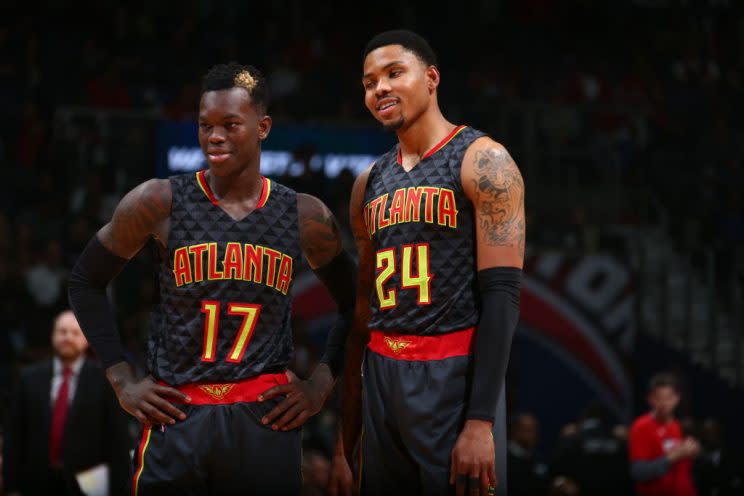
The Hawks never made an offer to incumbent four-time All-Star Millsap, whose three-year, $90 million deal was a mother lode for the Nuggets. And while Schlenk smartly picked up a first-round pick by facilitating Millsap’s move to the Nuggets in a sign-and-trade that sent Danilo Gallinari to the Los Angeles Clippers, Atlanta also had to take 37-year-old Jamal Crawford’s expiring $14 million price tag and seldom-used reserve big man Diamond Stone in return.
Meanwhile, the Hawks are hamstrung waiting for Tim Hardaway Jr.’s restricted free agency. The 25-year-old is one of the best wings left in a dwindling market, and he’s expected to see a substantial offer, so Schlenk will have another difficult decision on his hands. Atlanta already has $46 million tied up in Kent Bazemore, Dennis Schroder and Plumlee for the next few years. Locking up Hardaway means two-thirds of the cap committed to a mediocre core again.
Losing Millsap on top of trading Howard undoubtedly leaves the Hawks as clear-cut losers this summer, and likely lottery-bound moving forward. And that’s before they potentially lose role-playing contributors Thabo Sefolosha, Mike Muscala and Ersan Ilyasova in unrestricted free agency.
On the bright side, believe it or not, it’s not the worst strategy, especially if they let Hardaway walk. Schlenk added a fifth first-round pick in the next two years and created max cap space over that same period (again, if Hardaway leaves), maintaining flexibility to restock a roster left barren by the departures of all five starters from the franchise’s first 60-win season, just two years ago.
That’s if the Hawks can manage not to be losers in free agency. Again. — BR
Cleveland Cavaliers
Coming off a five-game loss in the 2017 NBA Finals, it seemed obvious to everyone watching that the Cavs would need a significant infusion of top-tier talent to be able to stand a legitimate chance of toppling the Warriors should the two teams cross paths in the championship round again. Visions of All-Stars past and present heading to Ohio — Paul George, Jimmy Butler, Carmelo Anthony, Dwyane Wade — danced in Cavs’ fans heads.
Instead, six days into free agency, all Cleveland’s got to show for its offseason are agreements to bring in Jose Calderon (age 35), and bring back Kyle Korver (age 36) and Richard Jefferson (age 37). Meanwhile, George is in OKC, Butler’s in Minnesota, and the Cavs have made precisely zero moves that would better equip them to handle the Warriors’ onslaught of offensive talent. That would still be true even if the Cavs are able to land Anthony, whether by engaging the Knicks in a trade or by picking him up on the open market after a buyout, because for all his still-real shot-making gifts, he’s a 33-year-old better suited to guarding fours than threes, and he’s not getting younger or faster.
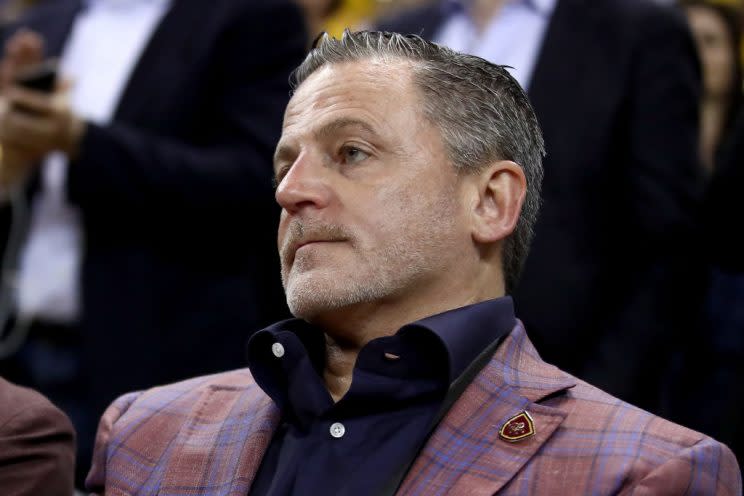
Oh, and the Cavs also still don’t have a general manager, after owner Dan Gilbert let David Griffin walk without so much as a heads up to franchise centerpiece LeBron James. No president of basketball operations, either, because top choice Chauncey Billups declined to take the gig, due in part to Gilbert reportedly trying to get away with paying him well below market-rate for the position (a staple of Gilbert’s front-office strategy) and perhaps in part due to fear that LeBron might pull up stakes in free agency next summer over concerns about the direction of the organization.
You might quibble with all that, noting that as Eastern All-Stars continue to migrate West with only the arrival of Gordon Hayward to signal a potential challenger to the throne, the Cavs remain favorites to advance to the Finals for a fourth straight season. That’s reasonable enough; after all, how can any team be considered a “loser” while it still employs LeBron James? But LeBron’s set to go back on the unrestricted market next summer, and while the idea of James leaving Cleveland again seemed unthinkable when he returned in the summer of 2014, it is now very much not that, thanks in part to the way things have unfolded for the Cavs over these past couple of weeks.
It’s possible that nothing that’s happened this summer will prevent the Cavs from winning the East again next spring. If it motivates James to take his talents elsewhere next summer, though … well, there’s not a font size big enough to represent that L. — DD
More from Yahoo Sports:
• Cubs ‘reliever’ fools hitters with Little League-speed pitches
• Sources: Pistons, Celtics make A-very big trade
• NFL players invest over $800K in lemonade company run by 12-year-old
• Nowitzki accepts massive pay cut to stay with Mavs


